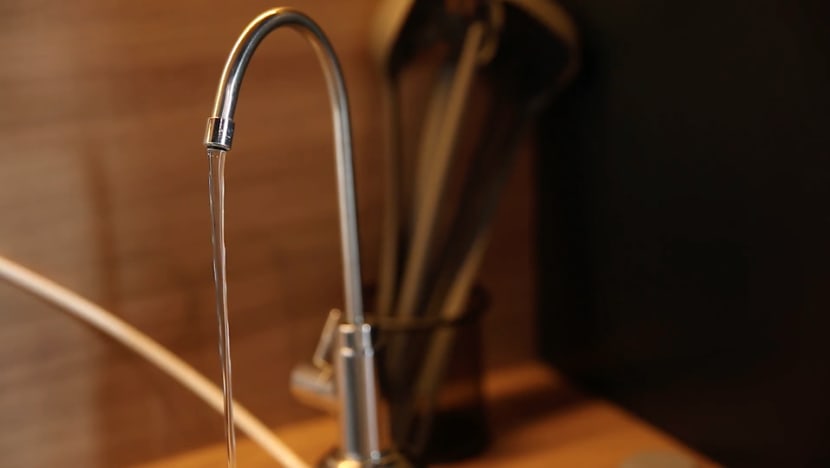Why filtered water may not be as clean or beneficial as you think
Given that Singapore’s tap water is among the cleanest in the world, are water filters necessary in this country? Could they be doing more harm than good? The programme Talking Point investigates.

SINGAPORE: From cloth filters that cost 30 cents each to S$100 water filter pitchers and even a worktop system that costs thousands of dollars, sales of water filters have increased over the years.
This is despite the fact that Singapore’s tap water is among the cleanest in the world, with national water agency PUB conducting rigorous tests on samples taken from source to tap so that the water remains clean throughout.
READ: Drink water from a public toilet? Singapore’s taps put to the test
Proponents of water filters say the water is cleaner and healthier, with impurities removed and minerals added. Water filter and alkaline water companies also advertise a laundry list of claims, from improved gastrointestinal health to detoxification and even cancer prevention.
But do these claims stand up to the test? Can substances like chlorine and fluoride be removed by filter, and minerals like magnesium, zinc and calcium be added to the water?
To find out, the programme Talking Point sent two samples of water taken from the same place — one from the tap, the other run through a filter with a reverse osmosis mechanism — to a laboratory.
With the help of laboratory manager Raymond Ong of SGS Testing and Control Services, Talking Point host Steven Chia found that the concentration of chlorine remained the same, at 0.1 milligrammes per litre (mg/l).
The filtered water had less fluoride, however: 0.1 mg/l compared with 0.5 mg/l in the tap water.
Ong noted that while this was the case, the permissible level for fluoride in Singapore’s water is 0.7 mg/l. “As long as it doesn’t go above that, it’s safe,” he said.
As for added minerals, the tests found no discernible change in the zinc level in the filtered water, while the magnesium level increased by 1 mg/l.
The calcium level, however, dropped from 13 mg/l in the tap water to 1 mg/l.
“If we were to add up all three minerals that we’re observing in our report, there’s actually a drop in overall mineral content,” said Ong. This means the filter removes more minerals than it adds.
WHAT ABOUT THE MARKETING CLAIMS?
In the course of its investigation, Talking Point also asked a food scientist about the veracity of several marketing claims, particularly that filtered water can improve gastrointestinal health, be absorbed by the body more easily and cure cancer.
Alkaline water, for example, is said to help neutralise stomach acids, cited National University of Singapore senior lecturer in food science and technology Leong Lai Peng.
“The thing is, the acid is there to help with digestion. If you neutralise it, then it doesn’t digest as well any more,” she noted. “There’s no reason why anybody would want to neutralise the acid in their stomach.”
As for the claim that filtered water is absorbed more easily because the molecules are smaller, she said water molecules do not change in size, “whether they go through the filter or not”.
“Water is water. There shouldn't be any difference at all between filtered water and normal tap water,” she added. “Both help you to hydrate.”
She also said there is “no evidence whatsoever” that filtered water can prevent cancer.
Nonetheless, she said filtered water can benefit some groups of people — such as immunocompromised individuals and those undergoing cancer treatment — because some filters can filter out harmful bacteria and viruses.
Indeed, while one water filter company CNA Insider contacted said they have had positive feedback about their products from customers with conditions like eczema, they noted that the majority of their customers do not buy their products for medical reasons.
Ruhens managing director Joel Lim said that his company does not focus on medical benefits as it believes that “pure water is the best”.
“Through our filters, customers can drink water that’s clean from rust, chlorine or other micro-particles that may be present in the water,” he said.
HOW THESE FILTERS WORK
Water filters on the market run the gamut from simple water pitchers to elaborate, under-the-sink set-ups. Ultimately, however, they come down to two broad categories: Those that remove contaminants from the water and those that claim to modify water.
WATCH: Do water filters really purify your water? (23:52)
There are two common types of filters in the latter category: Ion exchange filters and alkaline filters.
An ion exchange filter works as a “water softener” for hard water, said Kwok Chen Ko, who runs a blog called Water Quality in Singapore.
Hard water has a lot of calcium and magnesium, which the filter’s ion exchange resin captures, releasing soft water in the process.
This soft water is valued by coffee enthusiasts who believe the lack of minerals can prevent limescale build-up from clogging up coffee machines.
Alkaline filters, on the other hand, convert water by passing an electric current through it. Many people believe that the alkaline water produced is healthier.
In the other category, filters that remove contaminants from water use activated carbon, a common component in many filters.
But there is an issue, as Kwok pointed out: Over time, filters could allow bacteria to grow in them, and those with activated carbon are “of particular concern”.
“It adsorbs organic matter, which serves as food for bacteria,” he said. “So we’re talking about bacteria growing on your filter and coming out into your water.”
THE DIRTY TRUTH
A test run by Talking Point showed that filtered water could indeed be dirtier than tap water.
In the test, five households using filters contributed two samples of water: One from the tap and another run through their filter. While the filters contained different types of filter medium, all contained activated carbon.
The results showed a bacterial count of under 500 in tap water taken from four of the households — which is the safe limit imposed by the Singapore Food Agency.
But when it came to the filtered water, three households had a bacterial count ranging from 9,000 to 25,400.
SGS regional manager Guillaume Drillet, who led the tests, noted that the household with the highest bacteria count had used a filter that was a month overdue for a change.
“The longer you keep your filter running, the higher probability that you’ll have a regrowth of bacteria,” he said. “So it’s very important to follow the schedule proposed by manufacturers.”
Chia, whose household also participated in the test, had changed his filter a month prior to the test, but even the water from his filter had a bacterial count of 9,000.
“Bacteria regrow very fast. So as soon as you have nutrients and a surface … you’ll have the development of a biofilm,” said Drillet.
“This is why, technically, the water from the PUB is safer because there’s a control here. The water you receive … has been treated by the PUB and contains chlorine to forbid regrowth.
The filter may remove some of this chlorine, and act as a place where the bacteria can start re-growing.
While the tests were not conducted using filtered water from Ruhens, the company noted that bacteria can accumulate “almost anywhere” and that it is important to ensure that filters are changed on schedule.
Ruhens also said that using a tankless water filter — with parts that can be removed and cleaned — rather than one that stores water in a tank after filtration, can reduce the risk of bacterial growth.
Watch this episode of Talking Point here. The programme airs on Channel 5 every Thursday at 9.30pm.
Editor's note: A quote from Hydroflux's managing director in an earlier version of this story has been removed following a clarification by the company.

















